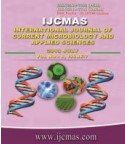


 National Academy of Agricultural Sciences (NAAS)
National Academy of Agricultural Sciences (NAAS)

|
PRINT ISSN : 2319-7692
Online ISSN : 2319-7706 Issues : 12 per year Publisher : Excellent Publishers Email : editorijcmas@gmail.com / submit@ijcmas.com Editor-in-chief: Dr.M.Prakash Index Copernicus ICV 2018: 95.39 NAAS RATING 2020: 5.38 |
A field experiment was conducted during rabi 2017-18 and 2018-19 at Agricultural College Farm, Bapatla to study the ‘Effect of potassium and nickel nutrition on total drymatter and yield in maize under heat stress’. The experiment was laid out in split plot design with three dates of sowing viz., December 20 (M1), January 10 (M2) and January 30 (M3) as main plots and eight subplot treatments as 100% RDK (control) (S1), 125% RDK (S2), 1kg Ni ha-1 as nickel chloride (S3), 2 kg Ni ha-1 (S4), 100% RDK+1 kg Ni ha-1 (S5), 100% RDK+2 kg Ni ha-1 (S6), 125% RDK+1 kg Ni ha-1 (S7) and 125% RDK+2 kg Ni ha-1 (S8). The results revealed that total drymatter and yield in maize was influenced significantly by dates of sowing as well as nutrient treatments during both the seasons. Among the dates of sowing during both the seasons, compared to M1 the total drymatter was reduced by 8.34, 6.59 per cent in M2 and 18.38, 11.86 per cent in M3 whereas the kernal yield was reduced by 17.98, 16.56 per cent in M2 and 50.23, 48.75 per cent in M3, due to delayed sowings. Application of potassium and nickel, except nickel application without potassium (S3 and S4) all other treatments enhanced the total drymatter by 6.49 to 31.51 per cent during 2017-18 and 4.89 to 24.64 per cent during 2018-19 whereas the kernel yield was increased by 6.56 to 29.98 per cent during 2017-18 and 6.18 to 28.36 per cent during 2018-19. The results revealed that application of potassium and nickel enhances the total drymatter and yield over control at all dates of sowing by contributing to a better plant growth and metabolism so that the plant can overcome the stresses undergone due to delayed sowings to some extent.
 |
 |
 |
 |
 |